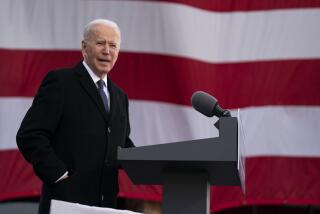Pointy Heads, Deadly Game
Investors can be so frighteningly on the money in predicting things like elections that, in theory, setting up a commodity-style market in which participants helped generals anticipate terrorist attacks, coups and turmoil might have harnessed the force of greed for the U.S. good. But a Bush administration plan to do so, one that officials pledged Tuesday to “terminate,” was unbelievably stupid.
Its unsavory doings could have included putting the government in the business of taking bets on whether the king of Jordan would be assassinated. Sen. Hillary Rodham Clinton (D-New York) characterized it as “a futures market in death.”
The plan was conceived largely by social scientists at Caltech under the supervision of John M. Poindexter, the national security advisor to the elder President Bush and the Reagan administration advisor who engineered the 1980s guns-for-hostages trade known as Iran-Contra. Last year, he developed another hare-brained program, dubbed Total Information Awareness. Aimed at countering terrorism by tapping computer databases for personal information on U.S. citizens, the program’s funding was whacked after lawmakers denounced it for trampling civil liberties.
Poindexter’s dicey record is a big reason why legislators should not take the word of Deputy Defense Secretary Paul D. Wolfowitz about the demise of this insane market. Displaying Total Information Unawareness on Tuesday, Wolfowitz claimed he learned about the ploy only that day, from the media. “I share your shock at this kind of program,” he assured senators. “We’ll find out about it, but it is being terminated.”
One question: Is the administration halting just this scheme or also its lesser-known predecessors? Last Dec. 19, the Pentagon published a notice calling on social scientists to develop market-like mechanisms to predict national security threats -- this as a continuation of its ongoing Electronic Market-Based Decision Support program.
By itself, this research is morally neutral. It relies on the work of Thomas Bayes, the 18th century English mathematician who believed that social scientists could never predict the future if all they did was debate chalkboard equations in academe; they also must find ways to factor in “street” voices, like those of the marketplace.
Poindexter’s latest project, however, horribly overreached. It would not only have predicted markets but also would have influenced them in repugnant ways, letting terrorists profit from their mayhem.
This project showed above all that, in their obsession with listening to vox populi, social scientists and the policy wonks who funded them grew deaf to ethics and moral responsibility. Soul-searching is in order in the ivy-covered towers. And it’s past time for Poindexter to go.
More to Read
Inside the business of entertainment
The Wide Shot brings you news, analysis and insights on everything from streaming wars to production — and what it all means for the future.
You may occasionally receive promotional content from the Los Angeles Times.










